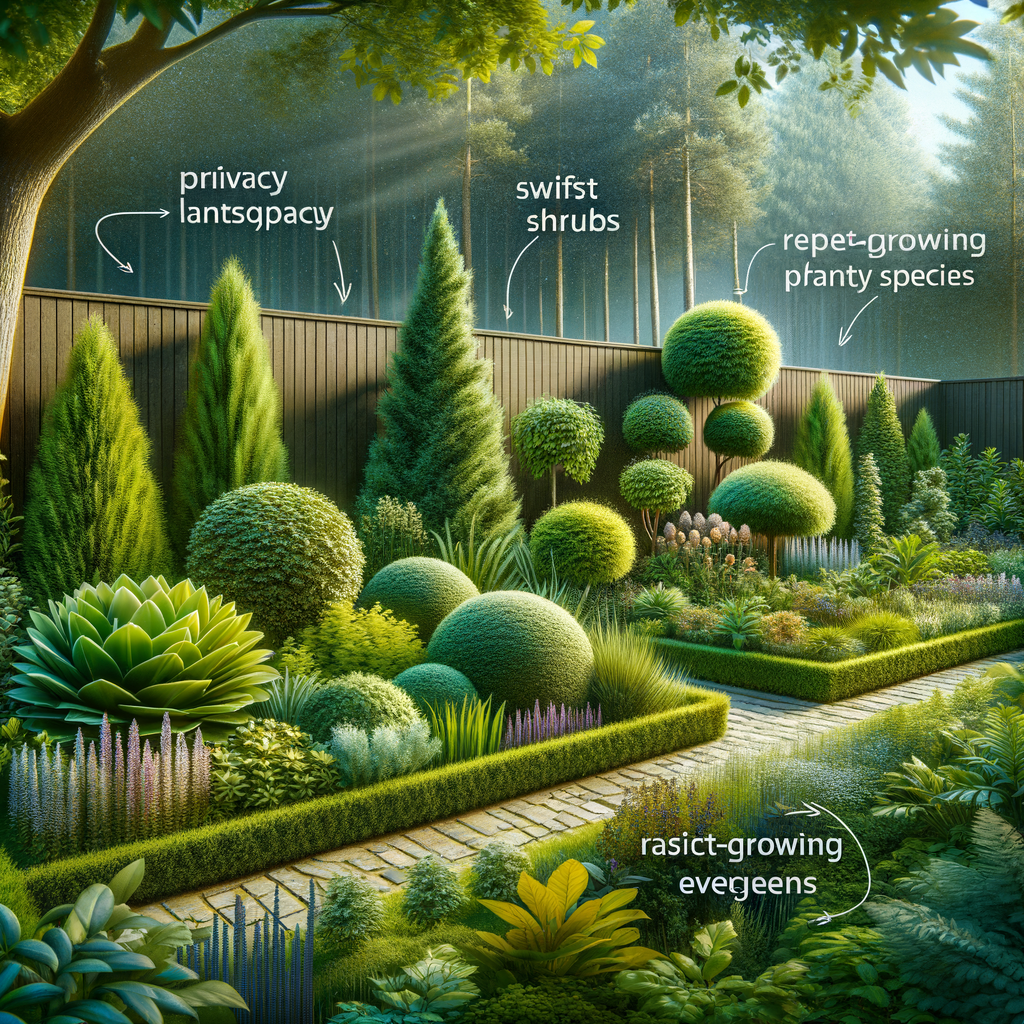
Introduction to Fast-Growing Plants for Privacy
Privacy is a cherished commodity in today’s fast-paced world, especially in residential areas. One of the most natural and aesthetically pleasing ways to achieve this is through the use of fast-growing plants. In this article, we will delve into the need for privacy, the role of plants in providing it, and introduce you to some fast-growing plants that can serve as a natural privacy screen.
- Understanding the need for privacy in residential areas
In our increasingly urbanized world, residential spaces are often built close together, leading to a lack of privacy. This can result in a feeling of being constantly observed, which can be uncomfortable. Privacy in your own home and garden is not just a luxury, but a necessity for peace of mind and security. It allows us to relax, enjoy our outdoor spaces, and live our lives without feeling watched.
- Exploring the role of plants in providing privacy
Plants play a crucial role in providing privacy. They act as natural barriers, blocking both sight and sound. A well-placed tree, shrub, or vine can shield your home from prying eyes, reduce noise from a busy street, and even act as a windbreak. Moreover, plants add beauty and value to your property, enhancing its aesthetic appeal while serving a practical purpose.
- Introduction to fast-growing plants as a natural privacy screen
Fast-growing plants are an excellent choice for creating a natural privacy screen. They can quickly fill in gaps in your landscape, providing immediate privacy. These plants come in a variety of types, including trees, shrubs, and vines, and can be chosen to suit your specific needs and preferences. In the following sections, we will discuss the benefits of using these natural screens, introduce you to some popular types of quick-growing plants, and provide tips on planting and maintaining them.
Benefits of Using Natural Privacy Screens
Using natural privacy screens has several advantages. Not only do they provide a sense of privacy, but they also offer a range of environmental, economic, and aesthetic benefits. Let’s delve into these benefits in more detail.
- Environmental Benefits of Using Plants for Privacy
- Cost-effectiveness of Natural Privacy Screens
- Enhancement of Aesthetic Appeal with Privacy Plants
Plants act as natural air purifiers. They absorb carbon dioxide and release oxygen, contributing to a healthier environment. Additionally, they provide a habitat for various species of birds and insects, promoting biodiversity. Privacy plants also help in reducing noise pollution, as they can absorb and deflect sound.
Compared to building fences or walls, using plants as natural privacy screens is a cost-effective solution. Once established, these plants require minimal maintenance, saving you time and money in the long run. They also add to the property’s value, making it a smart investment.
Privacy plants can significantly enhance the aesthetic appeal of your property. They add a touch of nature and a sense of tranquility to your outdoor space. With a variety of plants available, you can choose those that complement your home’s exterior and landscape design. Whether you prefer vibrant flowers or lush green foliage, there’s a privacy plant to suit your style.
In conclusion, natural privacy screens are an excellent choice for those seeking a cost-effective, environmentally friendly, and aesthetically pleasing solution for privacy. So, why not consider adding some to your garden?
Types of Quick Growing Shrubs and Plants for Privacy
When it comes to creating a natural privacy screen in your garden, choosing the right plants is crucial. In this section, we will explore some of the fastest-growing plants that can provide you with a lush, green privacy screen in no time.
Rapid Growth Plants
Let’s take a look at some of the rapid growth plants that are perfect for creating a natural privacy screen:
- Bamboo
- Privet
- Leyland Cypress
Bamboo is one of the fastest-growing plants in the world. Some species can grow up to 3 feet per day! This makes it an excellent choice for a quick and effective privacy screen. However, be aware that bamboo can be invasive if not properly managed.
Privet is a popular choice for privacy hedges due to its dense foliage and rapid growth. It can grow up to 2 feet per year, making it a great option if you’re looking for a quick solution. Plus, privet is easy to shape and maintain, allowing you to create a neat and tidy privacy screen.
Leyland Cypress is a fast-growing evergreen that can provide year-round privacy. It can grow up to 3-4 feet per year and reach a height of 60-70 feet. Its dense, dark green foliage makes it an excellent choice for a privacy screen. However, it requires regular pruning to keep it under control.
Choosing the right plants for your privacy screen depends on your specific needs and circumstances. Consider factors such as the size of your garden, the amount of sunlight it receives, and the level of maintenance you’re willing to commit to. Remember, the key to a successful privacy screen is choosing plants that grow quickly and densely.
Fast-Growing Trees
When it comes to creating a natural privacy screen in your garden, fast-growing trees are an excellent option. They not only provide a lush green barrier but also add a touch of nature’s beauty to your outdoor space. Let’s explore some of the fastest-growing trees that can enhance your garden’s privacy.
- Hybrid Poplar
- Weeping Willow
- Quaking Aspen
The Hybrid Poplar is one of the fastest-growing trees you can plant. It can grow up to 8 feet per year, reaching heights of 40-50 feet within just five years. This tree is well-known for its lush green foliage and tall, sturdy trunk, making it an excellent choice for a natural privacy screen. Plus, its rapid growth rate means you won’t have to wait long to enjoy your new, secluded garden space.
Next on our list is the Weeping Willow. This tree is not only fast-growing but also incredibly beautiful. It can grow up to 8 feet per year, reaching a height of 30-40 feet in a short time. The Weeping Willow’s long, drooping branches and dense leaves create a thick, natural curtain, offering excellent privacy. It’s a perfect choice if you’re looking for a tree that combines beauty with functionality.
The Quaking Aspen is another fast-growing tree that’s perfect for privacy. It can grow up to 5 feet per year, reaching heights of 20-50 feet. The Quaking Aspen is named for its leaves, which “quake” or tremble in the wind. This unique feature, combined with its rapid growth and dense foliage, makes it a popular choice for a natural privacy screen.
In conclusion, fast-growing trees like the Hybrid Poplar, Weeping Willow, and Quaking Aspen can provide a quick and natural solution to your garden’s privacy needs. Not only do they grow quickly, but they also add a touch of natural beauty to your outdoor space. So why wait? Start planting these fast-growing trees today and enjoy a private, green garden in no time.
Guide to Planting Privacy Hedges
Planting privacy hedges is a great way to add beauty to your outdoor space while also providing a natural barrier for privacy. However, it’s not as simple as just digging a hole and planting. There are several important steps to consider to ensure your hedge grows healthy and strong. Let’s explore these steps in detail.
- Choosing the right location for your privacy hedge
- Preparing the soil for planting
- Proper spacing for optimal growth
Location is key when planting a privacy hedge. You want to choose a spot that gets at least six hours of sunlight each day. This is because most hedge plants thrive in full sun. Also, consider the direction of the wind and the proximity to buildings or other structures. You don’t want your hedge to block sunlight from your house or be damaged by strong winds.
Preparing the soil is another crucial step in planting a privacy hedge. Start by removing any weeds or grass from the area. Then, loosen the soil with a garden fork or tiller. This helps the roots of the plants to spread and grow. Adding compost or organic matter to the soil can also improve its fertility and drainage, which will help your hedge to grow better.
Proper spacing between plants is essential for the growth of your privacy hedge. If the plants are too close together, they can compete for resources and hinder each other’s growth. On the other hand, if they’re too far apart, the hedge may look sparse. A good rule of thumb is to space the plants about a third of their mature width apart. For example, if the plants are expected to grow 3 feet wide, plant them 1 foot apart.
In conclusion, planting a privacy hedge requires careful planning and preparation. By choosing the right location, preparing the soil, and spacing the plants properly, you can create a beautiful and effective natural screen for your garden.
Natural Screening Plants Maintenance Tips
Keeping your natural screening plants healthy and attractive requires regular care and attention. Here are some essential maintenance tips to help you keep your privacy plants in top shape:
- Regular watering and fertilizing: Just like all living things, plants need water and nutrients to grow and thrive. The amount of water and fertilizer your plants need will depend on their species and the specific conditions in your garden. As a general rule, most privacy plants need to be watered deeply once or twice a week and fertilized once or twice a year. Always remember to water your plants early in the morning or late in the evening to prevent water loss through evaporation.
- Pruning and trimming for shape and health: Regular pruning and trimming not only help to maintain the shape of your plants but also promote their health by removing dead or diseased branches. The best time to prune your privacy plants is usually in late winter or early spring, before they start to put out new growth. Always use sharp, clean pruning tools to make clean cuts and prevent the spread of diseases.
- Monitoring for pests and diseases: Regularly inspect your plants for signs of pests and diseases. Common pests that attack privacy plants include aphids, scale insects, and spider mites, while common diseases include powdery mildew, leaf spot, and root rot. If you notice any unusual spots, discoloration, or damage on your plants, it’s important to identify the cause and treat it as soon as possible to prevent it from spreading.
In conclusion, maintaining your natural screening plants requires regular watering and fertilizing, pruning and trimming, and monitoring for pests and diseases. By following these maintenance tips, you can ensure that your privacy plants remain healthy and attractive for many years to come.
Garden Privacy Ideas and Privacy Landscaping Ideas
Creating a private and serene outdoor space can be achieved with the right landscaping ideas. Here, we will explore some unique and effective ways to enhance the privacy of your garden. These ideas will not only provide you with a secluded outdoor area but also add a touch of elegance and beauty to your garden.
-
Creating a Layered Look with Different Plant Heights
One effective way to create privacy in your garden is by using plants of different heights. This creates a layered look that is not only visually appealing but also serves as a natural privacy screen. Start with low-growing plants at the front and gradually increase the height of the plants towards the back. This can include a mix of ground covers, perennial flowers, shrubs, and tall trees. This method is not only aesthetically pleasing but also adds depth and dimension to your garden.
-
Using Trellises and Climbing Plants for Added Privacy
Another great idea is to use trellises and climbing plants. Trellises are structures that allow climbing plants to grow upwards, creating a natural and beautiful privacy screen. Some popular climbing plants include roses, jasmine, and ivy. This method not only provides privacy but also adds a touch of romance and charm to your garden. Plus, the sweet scent of blooming flowers will make your outdoor space even more inviting.
-
Integrating Garden Structures like Pergolas and Gazebos
Integrating garden structures such as pergolas and gazebos into your landscape design can also enhance privacy. These structures not only provide shade and a place to relax but also serve as a visual barrier. You can add climbing plants or hang curtains for added privacy. These structures can be a focal point in your garden and provide a secluded spot where you can enjoy the beauty of your outdoor space.
In conclusion, creating privacy in your garden doesn’t have to be difficult. With the right plants and structures, you can create a private, beautiful, and inviting outdoor space. Remember, the key to a successful garden design is to consider the needs of your space and to choose plants and structures that will thrive in your specific conditions.
Fast-Growing Evergreens for Year-Round Privacy
Evergreen plants are a popular choice for homeowners seeking a natural, year-round privacy screen. These plants, which retain their foliage all year long, are not only aesthetically pleasing but also offer a host of other benefits. We will delve into the advantages of evergreen plants, introduce some fast-growing varieties, and provide care tips to ensure their healthy growth.
- Understanding the benefits of evergreen plants for privacy
Evergreen plants serve as a natural barrier, providing privacy and reducing noise from the surroundings. They are an eco-friendly alternative to fences and walls, enhancing the beauty of your landscape while also providing a habitat for local wildlife. Moreover, evergreens are known for their resilience, withstanding harsh weather conditions and requiring minimal maintenance.
- Listing popular fast-growing evergreen varieties
| Evergreen Variety | Growth Rate |
|---|---|
| Green Giant Arborvitae | 3-5 feet per year |
| Leyland Cypress | 3-4 feet per year |
| Norway Spruce | 2-3 feet per year |
These are just a few examples of fast-growing evergreens that are perfect for creating a natural privacy screen. Each of these varieties is known for its rapid growth rate and dense foliage, making them ideal for this purpose.
- Providing care tips for evergreen privacy plants
While evergreens are generally low-maintenance, they do require some care to thrive. Regular watering, especially during dry spells, is crucial. It’s also important to prune your evergreens to maintain their shape and promote dense growth. Additionally, applying a slow-release fertilizer in the spring can provide the necessary nutrients for healthy growth.
In conclusion, fast-growing evergreens are an excellent choice for homeowners seeking a natural, year-round privacy solution. With their numerous benefits and easy care requirements, they are a valuable addition to any landscape.
Conclusion: Embrace the Power of Quick-Growing Plants for Privacy
In this article, we’ve explored the world of quick-growing plants and how they can provide a natural, beautiful, and effective solution for privacy in your garden. Let’s recap what we’ve learned and why you should consider embracing these green giants.
- Recap of the benefits and types of fast-growing privacy plants: Quick-growing plants offer numerous benefits. They provide a natural barrier, enhance the beauty of your garden, and are a cost-effective solution for privacy. We’ve discussed various types such as bamboo, cypress, and privet, each with their unique growth rates and aesthetic appeal.
- Encouragement to experiment with different privacy landscaping ideas: Don’t be afraid to get creative with your privacy landscaping. Mix and match different types of plants, consider the use of trellises or garden structures, or even create a layered effect with plants of different heights. Your garden is your canvas, and these quick-growing plants are your paint.
- Final thoughts on the importance of natural privacy solutions: In a world where we’re increasingly surrounded by concrete and glass, natural privacy solutions offer a breath of fresh air. They not only serve a practical purpose but also contribute to a healthier environment and a more beautiful world. So, why not make the switch and embrace the power of quick-growing plants for privacy?
Remember, your garden is a reflection of your personality and taste. So, choose plants that you love, and that will thrive in your specific climate and soil conditions. With a little patience and care, you can create a lush, private oasis right in your backyard. Happy planting!






